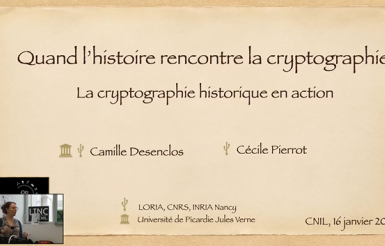Glen Weyl: “We need to find ways to organize collectively to exercise our rights online”
Rédigé par Félicien Vallet
-
21 novembre 2018Following his visit to our labs, LINC interviewed Glen Weyl, a principal researcher at Microsoft, on technology, social innovation and the new challenges raised by data economy at the digital age.

LINC: You define yourself as a “liberal radical”. The choice of the words is important, in particular since they do not convey the same meaning across all cultures. Could you explain what you mean when you use those terms?
To me, “liberal” does not mean what it means in France or in the U.S. but rather the general attitude of opposition to concentrated power which I think is the animating spirit of the French Revolution. In short, the opposition to hierarchical historically derived authority. The “radical” means that, unlike other forms of liberalism like liberal individualism (which has been dominant in recent history), we acknowledge the fundamentally social nature of life. So, in order to protect individuals we need to protect their ability to organize collectively to defend their interests.
It is a non-individualistic form of liberalism that seats for dynamic diverse communities to protect the individuals. Historically the liberal radical tradition has a strong resonance in France with some great economists such as Léon Walras, le marquis de Condorcet or Alexis de Tocqueville and great political leaders such as Georges Clemenceau. These are all liberal radical thinkers who thought about the importance of community to creating a liberal society.
Among other fields, you have studied how the digital economy is organized. More specifically, you have come to highlight that data cannot only be seen as an “asset” but also as a form of “labor”. Can you elaborate?
This idea comes from the fact that all of these things related to training machine learning algorithms are outgrowth of actions that we take. A lot of people say that those actions are just passive but the truth is that they're actually a result of the people that we've become: if we weren't educated, if we didn't speak the language that we spoke, if we didn't know the things we did about human culture, none of those data would have the value that they have.
Labor is a result of the abilities that we've developed just as are the things we do in work. Many of the things that we do at work are not purely effort: they are the comments we give to people, they are the discussions we have, the insights that come from having us around, etc. Also, we have to remember that our concept of labor evolves over time. As an example, I yesterday paid 30 dollars to go and lift weights and on the other hand I get paid to have conversations like this about the future of the world. 300 years ago, it would have been quite the reverse!
Thus, what really defines labor to me is: i) things that are intimately important to you, meaning that are very personal and could be seen as a part of your body, ii) things that also have value to others, iii) things that, if you were rightly compensated for, you could do more and better. All these aspects are true for the data that we provide online. For all those reasons, I believe we should think of data as result of a labor that belongs to the mass of people and not just as a capital asset that can be hoovered up by whatever company that is clever enough to grab a hold of it.
The advent of the current digital era is often compared with the industrial revolution. In your recent publications, you draw a parallel with what happened at the end of the 19th century and stress the importance of having new unions, cooperatives or syndicates to represent the interests of users.
This goes really back to the notion of liberal radicalism. At the end of the 19th century, liberalism was seeking ways to avoid the concentrations of power and a naive version of it thought that all you would need to do it would be to end slavery. The idea was: “if we just abolish slavery and serfdom and let people go to the cities everybody will be free and we'll have an egalitarian society”. But, because there was so much power and capital (and capital was most profitable and concentrated), people very quickly ended up becoming wage slaves in cities.
I think something similar happened online in the sense that the internet is an open thing and the popular idea was that it should not be regulated so people would enjoy it and be free. It turns out that that attitude convinced people to give their data away for free and to work for free for the big tech companies. What ended up happening was that all the value flowed into the pockets of the people who controlled those bottlenecks and the capital.
Therefore, what we need to do now is take the same stand that was taken back into the 19th century which was to say: “it is not enough to just set things free you actually need to organize collectively otherwise we will be overwhelmed by the concentrated power of capital”. And for this we need a version of that third party, syndicate, union, cooperative, etc. that I call MIDs, “mediators of individual data”, in my works.
It turns out that these MIDs are actually being much discussed these days. For example, Sidewalk Labs (a Google-Alphabet subsidiary) recently went public about the creation of a “Civic Data Trust” dedicated to monitor the data collected by the Sidewalk Toronto neighbourhood project Quayside (as we reported last year). Does this attempt satisfy the governance principles for MIDs you specify in your works? Some say it does not…
They are very vague about what their intentions are for the nature of the governance but I think, in order to be a success, this “Civic Data Trust” has to be a fiduciary for the people in that community. Thus, it needs:
- to be not representing anyone other than the people present in that community,
- to derive the revenue needed to support it from the people in the community and not just from those who use the data,
- some sort of public funding or funding that's donated by someone without any strings attached,
- to have an exclusive legal duty to represent the people in that community,
- to be competent enough to bargain with those that want to use that data,
- to have some notion of maintaining the integrity for the individuals within that community of their data. Such things can be achieved using technical means such as differential privacy, so that the use of the data might be sold without it ever leaving this trusted repository which acts on behalf of the community.
These are some of the principles we developed that we think are critical in order to develop an effective fiduciary for the people that it's meant to represent.
Finally, Europe strengthened the protection of its citizen in the digital world with the General Data Protection Regulation (GDPR), which became applicable last May. What is your view on this new legal tool and how do you see it empowering individuals?
I think the benefit of the tool is that it offers some potential basis for portability, some potential basis for reclaiming data that has been alienated from people from the big platforms who have hoovered it up. Those are obviously very useful, but I don't think individuals can, as the GDPR suggests, exercise their rights in a purely individualistic manner. They need to find some ways to organize collectively and probably to allow in a collective delegation the exercise of some of those rights because it's too much of a burden for each individual to download their data on their own completely independently or to figure out exactly what usage should and should not be right. So, there needs to be some capacity for it to enable people to do collective organization around this rather than a purely individual exercise.
Further reading:
- Eric A. Posner & E. Glen Weyl, Radical Markets, Uprooting Capitalism and Democracy for a Just Society, Princeton University Press, April 2018.
- Jaron Lanier & E. Glen Weyl, Blueprint for a Better Digital Society, Harvard Business Review, September 2018.

Glen Weyl
Glen Weyl is principal researcher at Microsoft Research New York City, where he works on political economy and social technology. He also teaches at Princeton University.
Illustration : Flickr cc-by Kheel Center

